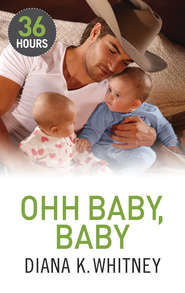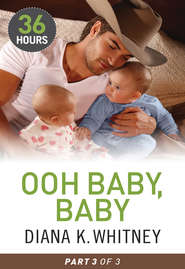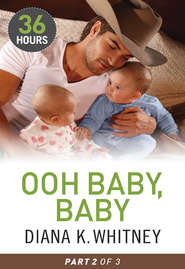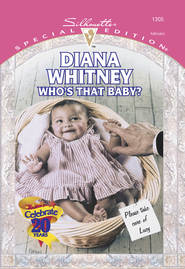По всем вопросам обращайтесь на: info@litportal.ru
(©) 2003-2024.
✖
A Dad Of His Own
Автор
Год написания книги
2018
Настройки чтения
Размер шрифта
Высота строк
Поля
“Nine and a half.” He swallowed, reached for the glass of milk and drained half of it in a single swallow. “I’ll be ten in March.” He started to wipe his mouth with his sleeve, then noticed the stack of linen napkins Clementine had laid by the cookie platter and used one of them instead. “Mom says I’m smart for my age.”
“That you are, laddie, that you are.” Wise blue eyes twinkled over lenses that looked like they’d been chopped in half. “You must be a crafty young man to have found your way into San Francisco all by yourself.”
Bobby shrugged. “It wasn’t no big deal. My teacher got a big bus to take the whole class to the museum today, so when the rest of the kids went inside, I ran around the corner and looked for a cab.”
“Ah, how clever. Don’t you think your teacher might be a wee bit perturbed when she notices you’re gone?”
“Nah. If she asks where I am, my best friend, Danny, is gonna tell her I’m in the bathroom.” Bobby glanced at an ornately carved wall clock positioned between a pair of intricate tapestries. “Only I’ve gotta be back by two o’clock, ’cause that’s when the school bus is gonna be back to take everyone home.”
“And home is—” she adjusted her glasses, peering down at the file “—in Marysville? That’s quite a distance. How is it you decided to visit me instead of enjoying the museum with your class?”
Bobby sucked in a breath. His hands were sweaty and kind of cold, so he wiped his palms on his jeans. “A long time ago you helped my friend Danny get adopted. He told me I should call you, on account of you’re real good at finding parents for people.”
“I see.” Clementine studied the open file. She looked sad, so Bobby figured she was looking at his birth certificate. His whole name was there, Robert James Margolis. So was his mom’s, along with the name of a man he’d never known.
“Can you find my dad?” Bobby blurted.
“Ah, so it’s your father you’re seeking, is it?”
Without warning, Bobby’s throat went dry, and his eyes went wet. He laid the half-eaten cookie aside, took another healthy swallow of milk. His heart was beating really fast, and his hands were still cold.
Closing the file, Clementine rocked quietly for a moment, stroking the sleeping cat in her lap. “Your mum doesn’t know you’re here, does she, child?”
Bobby sniffed, shook his head. “She doesn’t like to talk about my daddy. I think she figures it’ll make me sad.” Actually, Bobby had only asked her once, when he’d been just a little kid. Her eyes had gotten all red and watery. She’d promised they’d talk about it when he was older. Bobby was older now. He was almost grown up. But his mom had broken her promise.
Squaring his shoulders, he hiked his chin, willed his lip to stop quivering. “I brought money.” Digging into his pocket, he retrieved a crumpled wad of bills, $18.65 that represented his life savings. He plunked it all beside the cookie platter, then remembered he’d need cab fare, and stuffed five dollars back into his pocket.
Noting a peculiar expression on Clementine’s wrinkled face, he quickly added, “I got more.” Squirming in the chair, he pulled the boom box reverently into his lap. It had been a Christmas gift from his mother, and was his most treasured possession. “This is worth a whole bunch of money, maybe even fifty dollars. It has real good sound. You can make it so loud that the speakers puff out. It’s got bass and treble adjustments—” he demonstrated with a flick of the slide bar “—and it plays tapes and CDs and all the cool radio stations. It’s really neat.”
Clementine’s smile was kind of sad. “Is it now?”
“Want me to turn it on for you?”
“That won’t be necessary. ’Tis a fine instrument, to be sure.”
“Oh.” Swallowing a stab of disappointment at not being able to play his beloved music one last time, he reached inside his shirt, pulled out a wrinkled envelope with the name of the man he’d yearned for all his life. He touched the smeared ink with his fingertip, then passed the envelope to Clementine. “It’s a letter to my dad, for when you find him.”
She took it gently, cradled it in those gnarled hands as if it were as fragile as a butterfly. “Tell me why you’re wanting to locate him after all these years.”
The request surprised him, made him think for a moment. “’Cause there’s gonna be a father-son picnic next month, and I don’t wanna get stuck with dorky old Mr. Brisbane again.”
“Mr. Brisbane?”
“Yeah. He’s the school janitor, and he always partners up with kids who don’t have dads so they don’t feel, you know, left out and stuff.”
“That’s very nice of him.”
Bobby shrugged. “Yeah, I guess, only I’m sick of borrowing dads all the time. I want my own dad.”
“Of course you do,” Clementine murmured. “Every boy deserves a father of his very own.”
Hardly daring to breathe, Bobby leaped to his feet, clutching the boom box to his chest. “So you’ll do it, you’ll find him for me?”
“I’ll do my best, lad.”
A tremor of excitement shook him to his sneakers. He heaved a sigh of relief, and would have laid the boom box on Clementine’s desk had she not extended a hand to stop him.
“You keep it safe for me, child, until I find just the perfect place for it.”
He swallowed hard. “You mean it?”
“I do indeed. Deirdre?” In less than a heartbeat the pretty, dark-haired woman stepped into the room. “Will you please call a cab for young Mr. Margolis? He has a bus to catch.”
Deirdre flashed Bobby the brightest smile he’d ever seen in his whole life. “Of course.”
At the doorway, Bobby hesitated, glanced over his shoulder. “Danny was right. You’re a real nice lady.”
Clementine’s chuckle startled the snoozing cat. “Thank you, lad.”
His gaze flickered to the small wad of bills and scattering of coins on the corner of her desk. Chewing his lip, he motioned to Deirdre, who bent down so he could whisper in her ear. “Do you think that’s enough money?”
“More than enough,” Deirdre whispered back. “Clementine doesn’t care about the money.”
“Then why does she do stuff?”
“For the children, of course. It’s always for the children.”
The house was larger than he’d expected, old and quaint, with fading gray clapboards and a covered porch hung with a riot of blooming flowers. A pair of peaked-roof dormers protruded from the second story like startled eyes keeping watch on the neighborhood. The lawn was sparse, closely clipped but barren in spots, as if well used by the same children who played there now. Happy laughter echoed in the dry autumn air, a universal symbol of boyish joy.
A fat gray cat sprawled on the porch rail, tail twitching in time to the music blasting from one of those massive portable stereo units with speakers powerful enough to blast paint off a wall. It blared with the pulsing discordance popular nowadays, although the undulating rhythm made his teeth ache and raised the fine hairs along his nape. Aggravating adults was the purpose of youthful music. In that context, the chaotic sounds emanating from the shiny black boom box had done its job.
The entire image was enthralling, the scampering children, the biting noise punctuated by thrilled laughter, hoots of joy. Memories in the making, he thought, sweet images of childhood that would someday be cherished beyond measure. Childhood was such a fleeting thing. His own had ended all too soon.
From his vantage point across the street, he gazed out his car window at the youngsters playing soccer on the scuffed lawn. A gregarious blonde was the leader, a shouting, whirling, whistling bundle of knobby-kneed energy shrieking orders like a five-star general, orders that his teammates cheerfully ignored. A sweating, heavyset child puffed around the makeshift field as if every step was an effort. Others encouraged him, included him, although it was painfully apparent that the chubby child’s soccer skills were far below those of his friends.
Joining the game was a lanky youth with hair shorn over the ears to leave a peculiar hank at the crown pulled into a ponytail, and a youngster wearing a ripped football jersey who seemed to be the clown of the group. He pranced, danced, cheered, jeered and wiggled his bony butt at the slightest provocation, much to the delight of his giggling comrades.
There was also a boy slightly smaller than the others, quieter, wearing a white T-shirt so huge it hung nearly to his denim-clad knees. Tufts of straight brown hair poked out from under a blue baseball cap worn backward so the bill covered his nape, but exposed large, anxious eyes.
It was this boy who tossed a chummy arm around the heavyset child’s shoulders when a kick-pass was missed. The smaller boy said something with a grin and a shrug that made the chubby youngster smile. He liked that.
In fact, he liked everything he saw. The hoots and hollers of kids at play, the sweaty little faces and the whirling energy of youthful exuberance on a clear Sunday afternoon. Even from a distance he could see that the boys were very different from each other, every bit as unique in style and personality even at this tender age as the adult men they would become. Each of them appeared happy, well cared for and loved. Each undoubtedly possessed special talents, specific gifts. Children at play, laughing, eager, filled with joy. A lump lodged in his throat as he watched, awestruck.
He wondered which one was his son.
“Bobby, lunchtime!”
“Aw, Mom, five more minutes, please?”











